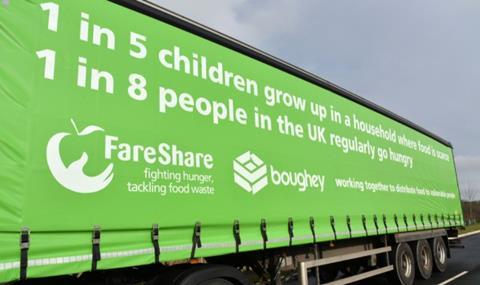
A partnership forged between Boughey Distribution, its customers and food charity FareShare has generated 1.5 million meals for vulnerable people in just two years.
Cheshire-based Boughey delivers ambient food products across the UK and is working with a growing number of customers who donate surplus products to FareShare. The company then transports the food to FareShare’s 30 depots, free-of-charge for journeys of up to 30 miles.
FareShare has experienced significant growth induced by the pandemic resulting in a vast number of people across the country needing support with food provision. The charity’s profile also increased due to the relationship it established with Manchester Utd footballer Marcus Rashford MBE who continues to campaign to support families at risk of hunger.
Read more
- Boughey Distribution does its FairShare to tackle child hunger in the UK
- Boughey overcomes trading volatility to deliver solid first half results
- Boughey Distribution takes delivery of first Volvo new generation FH vehicles as part of £11m fleet renewal programme
“It’s an amazing achievement to have notched up 1.5 million meals for the charity," said Boughey's transport operations director Neil Trotter. "We currently have around 25% of our customers contributing surplus food, and during 2022 we are planning to significantly increase the number of those on-board.
“The FareShare partnership provides our customers with a great option to use surplus food in a very positive way, both in terms of preventing waste going to landfill and using their products to address hunger in this country.
“Our link with FareShare has really resonated with our customers. We have set up an easy process for the distribution of surplus products to the charity so that it has minimum impact on their day-to-day operations. Our sophisticated stock control system also means we can alert customers when food they hold with us is getting close to its best before date.
“Customers can also potentially benefit financially by avoiding charges relating to the return of products, collection costs for food bins, landfill tax and labour to remove packaging.”













